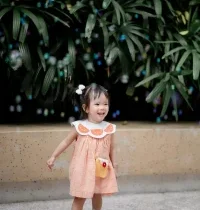Whoever Receives One Child in My Name
 In times of economic and social stress, a common practice is to blame those who are different, not from one’s own family or community, for the difficulties all are facing. The sense is that if these others hadn’t come into our part of the world, all would be well. After all, they may not look like me or eat the same foods. They may wear different clothes or style their hair differently. Their music may be different. They may worship differently. Could it be that they are inherently bad or evil or responsible for the problems we are facing now? The question arises in many ways, both overt and subtle.
In times of economic and social stress, a common practice is to blame those who are different, not from one’s own family or community, for the difficulties all are facing. The sense is that if these others hadn’t come into our part of the world, all would be well. After all, they may not look like me or eat the same foods. They may wear different clothes or style their hair differently. Their music may be different. They may worship differently. Could it be that they are inherently bad or evil or responsible for the problems we are facing now? The question arises in many ways, both overt and subtle.
All too easily, this kind of thinking leads to a conclusion that is unwarranted: “Of course! All was well before they came, so they must be the reason things have changed for me and my family.” “We need to send them back to where they came from!”
But was everything really all right before others came into our lives? Not usually. There have always been challenges in our communities and nations. Peoples have moved from region to region through all of recorded history – most likely even earlier. Otherwise, how would humans have come to live all over the world?
For better or worse, movements of peoples often lead to strife, including wars and massacres. We humans are not very good at trusting that most folks really aren’t that different from each other. Our concerns are very similar. It’s our customs and ways of meeting those concerns that differ. Since there are so very many people and environments, it’s not unreasonable that many different ways of addressing the challenges we find in our local areas have been developed. When we get to know each other, we find many commonalities. In fact, much of what we take for granted today came from the meeting of peoples from different lands with different traditions.
How do we deal with conflicts when they arise? Whose paths do we follow when we face challenges as communities and nations? Do we look at what the bullies, strongmen, and dictators – those who live in fear and rule by fear – propose as the reasons for economic and social challenges? Do we need to be afraid? Do we need to close out social interaction? Do we need to build “forts” around our communities? Would higher walls fix anything? Should we just toss out everyone and their families who have come to this community from somewhere else? What if they were born here but look different than my family and I do?
Or do we welcome the newcomers and learn from the gifts and insights they bring? Where do we draw the line? What do we do?
St. James asks us to reflect, “Where do the wars and where do the conflicts among you come from? Is it not from your passions that make war within your members?”
When we listen to those fears and passions that can be so easily stirred up by powerful people whose interests are best served by keeping the less powerful up in arms against other less powerful neighbors, we do not receive the blessings we seek. As St. James notes, “Where jealousy and selfish ambition exist, there is disorder and every foul practice, But the wisdom from above is first of all pure, then peaceable, gentle … full of mercy and good fruits.” (Jas 3:16-4:3)
Those who call others to live together in peace are often opposed by the powerful, as noted by the writer of Wisdom. “Let us beset the just one, because he is obnoxious to us… reproaches us for transgressions of the law… Let us put the just one to the test that we may have proof of his gentleness.” Such testing can even lead to the death of the one who works for justice. (Wis 2:12, 17-20)
Notice what happened to leaders of the Civil Rights movement in the United States. Many were beaten, imprisoned, and even killed. But through their patient endurance, things began to change.
Today, children who look different, with ancestors from around the world, can attend class together and be friends. They can work together to find solutions to the challenges they face in daily life. They can go to parties together. They can go fishing or camping together. They can date. They can marry and raise children.
Jesus’ disciples fell into the common human pattern of trying to compete for high position. He had been telling them that he would be killed and would rise from the dead, but what they focused on was something totally different. Who would be the most powerful among themselves?
Teaching them with a clear example, he brought a small child into the group of them. “If anyone wishes to be first, he shall be the last of all and the servant of all.” Then he went further, “Whoever receives one child such as this in my name receives me.” (Mk 9:30-37)
How we treat our children, what we teach them is critical. Do we teach them to welcome people who have had different experiences and come from other communities? Or do we teach them to fear those who are different? What does that do to our communities, to our nation? What does it do to our world?
The song, “You’ve Got to Be Taught,” from Rogers and Hammerstein’s musical, South Pacific, is a beautiful reminder of the dangers of prejudice based on skin color or national origin. As the song points out, this all begins before children are consciously able to distinguish among people by these accidents of birth – “before you are six, or seven, or eight!” You must learn “to hate all the people your relatives hate. You’ve got to be carefully taught.”
As we look around us today and see the controversies over immigration, access to jobs and health care, support for families who are food-insecure or who have no housing, it’s critical to remember that people don’t deliberately decide that what they want is to leave their homes so they can suffer homelessness and poverty in another land. They don’t leave with the idea of taking jobs from the people in other lands or diminishing those communities to which they are traveling. They leave because they have to go from where they are or be killed. Those who were born here and yet lack the basic necessities also need help and support. They didn’t choose their parents any more than those born into wealth and opportunity did.
When basic needs are met, then people are able to grow and learn. They are able to develop the skills needed to earn a living and provide for their families.
When adults treat others who are from different backgrounds with respect and care, children learn that all are valued and all have dignity.
What do we learn from the children whom Jesus gave us as models? They play with each other. They learn from their families and teachers. They grow to be adults. They are open to receive love and to share it with their peers. As long as we don’t teach them to be afraid of others by the way we act, they will continue to act with wisdom in dealing with those they meet on this journey of life. And how do we teach them to be kind and open to the gifts of others? By the way we model this through our lives as they watch and learn how to behave in their society.
May we as a people remember this lesson – to be like children, open and loving, not focused on who gets the most or who is best. We teach our children to share. We teach them to make friends. We are stronger when we model and teach living love and acceptance than when we teach fear and hate. May we accept each day with the joy and hope of a child who is unafraid of others and who can trust that they too will have their needs met and dreams supported. May we welcome others, including the children in our midst, as we would ourselves hope to be welcomed.
“You’ve got to be taught” – whether to be afraid or to welcome “the stranger” in our midst. Through meeting and accepting “the stranger,” we meet and welcome the Lord who lives in each of us and promises, “Whoever receives one child in my name receives me; and whoever receives me, receives not me but the One who sent me.”
May this be our quest as we go through this week. May we see the face of the Lord in all we meet. Then may we see his loving smile in the response of those we meet.
Readings for the Twenty-fifth Sunday in Ordinary Time – Cycle B










